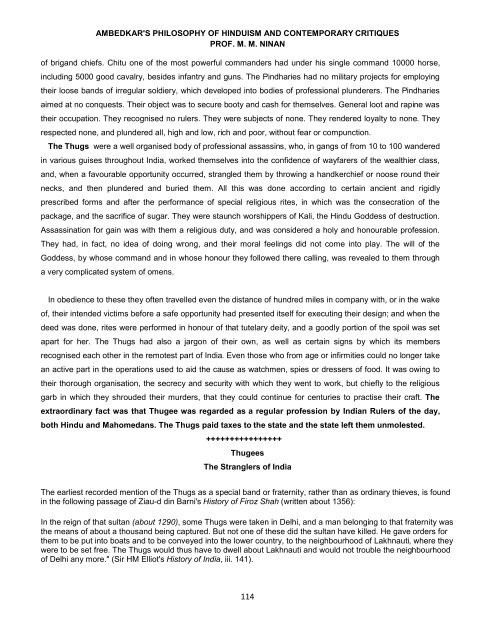Ambedkar-Philosophy of Hinduism
You also want an ePaper? Increase the reach of your titles
YUMPU automatically turns print PDFs into web optimized ePapers that Google loves.
AMBEDKAR'S PHILOSOPHY OF HINDUISM AND CONTEMPORARY CRITIQUES<br />
PROF. M. M. NINAN<br />
<strong>of</strong> brigand chiefs. Chitu one <strong>of</strong> the most powerful commanders had under his single command 10000 horse,<br />
including 5000 good cavalry, besides infantry and guns. The Pindharies had no military projects for employing<br />
their loose bands <strong>of</strong> irregular soldiery, which developed into bodies <strong>of</strong> pr<strong>of</strong>essional plunderers. The Pindharies<br />
aimed at no conquests. Their object was to secure booty and cash for themselves. General loot and rapine was<br />
their occupation. They recognised no rulers. They were subjects <strong>of</strong> none. They rendered loyalty to none. They<br />
respected none, and plundered all, high and low, rich and poor, without fear or compunction.<br />
The Thugs were a well organised body <strong>of</strong> pr<strong>of</strong>essional assassins, who, in gangs <strong>of</strong> from 10 to 100 wandered<br />
in various guises throughout India, worked themselves into the confidence <strong>of</strong> wayfarers <strong>of</strong> the wealthier class,<br />
and, when a favourable opportunity occurred, strangled them by throwing a handkerchief or noose round their<br />
necks, and then plundered and buried them. All this was done according to certain ancient and rigidly<br />
prescribed forms and after the performance <strong>of</strong> special religious rites, in which was the consecration <strong>of</strong> the<br />
package, and the sacrifice <strong>of</strong> sugar. They were staunch worshippers <strong>of</strong> Kali, the Hindu Goddess <strong>of</strong> destruction.<br />
Assassination for gain was with them a religious duty, and was considered a holy and honourable pr<strong>of</strong>ession.<br />
They had, in fact, no idea <strong>of</strong> doing wrong, and their moral feelings did not come into play. The will <strong>of</strong> the<br />
Goddess, by whose command and in whose honour they followed there calling, was revealed to them through<br />
a very complicated system <strong>of</strong> omens.<br />
In obedience to these they <strong>of</strong>ten travelled even the distance <strong>of</strong> hundred miles in company with, or in the wake<br />
<strong>of</strong>, their intended victims before a safe opportunity had presented itself for executing their design; and when the<br />
deed was done, rites were performed in honour <strong>of</strong> that tutelary deity, and a goodly portion <strong>of</strong> the spoil was set<br />
apart for her. The Thugs had also a jargon <strong>of</strong> their own, as well as certain signs by which its members<br />
recognised each other in the remotest part <strong>of</strong> India. Even those who from age or infirmities could no longer take<br />
an active part in the operations used to aid the cause as watchmen, spies or dressers <strong>of</strong> food. It was owing to<br />
their thorough organisation, the secrecy and security with which they went to work, but chiefly to the religious<br />
garb in which they shrouded their murders, that they could continue for centuries to practise their craft. The<br />
extraordinary fact was that Thugee was regarded as a regular pr<strong>of</strong>ession by Indian Rulers <strong>of</strong> the day,<br />
both Hindu and Mahomedans. The Thugs paid taxes to the state and the state left them unmolested.<br />
++++++++++++++++<br />
Thugees<br />
The Stranglers <strong>of</strong> India<br />
The earliest recorded mention <strong>of</strong> the Thugs as a special band or fraternity, rather than as ordinary thieves, is found<br />
in the following passage <strong>of</strong> Ziau-d din Barni's History <strong>of</strong> Firoz Shah (written about 1356):<br />
In the reign <strong>of</strong> that sultan (about 1290), some Thugs were taken in Delhi, and a man belonging to that fraternity was<br />
the means <strong>of</strong> about a thousand being captured. But not one <strong>of</strong> these did the sultan have killed. He gave orders for<br />
them to be put into boats and to be conveyed into the lower country, to the neighbourhood <strong>of</strong> Lakhnauti, where they<br />
were to be set free. The Thugs would thus have to dwell about Lakhnauti and would not trouble the neighbourhood<br />
<strong>of</strong> Delhi any more." (Sir HM Elliot's History <strong>of</strong> India, iii. 141).<br />
114


















